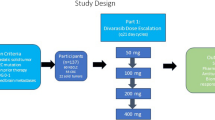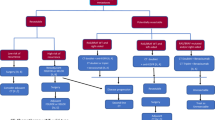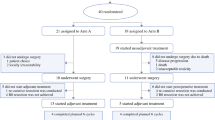Abstract
Weekly cetuximab plus irinotecan-based regiments are standard first- and second-line chemotherapy for patients with KRAS wild-type metastatic colorectal cancer (mCRC). However, the chemotherapy regimens are given every 2 weeks, which is asynchronous with cetuximab weekly administration. This study investigated the efficacy and safety of biweekly cetuximab administration in patients with mCRC. Twenty-six patients with KRAS wild-type mCRC, who received biweekly cetuximab plus FOLFIRI/irinotecan as first/second-line chemotherapy, at least three cycles of cetuximab and once CT evaluation in West China Hospital from May 2010 to February 2013, were retrospectively analyzed. The median number of cetuximab administrations was 8.3 (range 3–20). Fourteen patients received FOLFIRI as first-line therapy; response rate was 50.0 %; median PFS was 8.8 months (95 % CI 4.9–12.7). Ten patients received FOLFIRI and two patients received irinotecan as second-line therapy; response rate was 33.3 %; median PFS was 4.6 months (95 % CI 0.9–8.3). The toxicity was similar to weekly cetuximab combination schedules. Rash was observed in 69.2 % of evaluable patients (grade 3 in 7.7 %). Overall, our results show that biweekly cetuximab plus FOLFIRI/irinotecan may be as effective and safe as the standard weekly schedule.

Similar content being viewed by others
References
Chen W, Zheng R, Zhang S, et al. The incidences and mortalities of major cancers in China. Chin J Cancer. 2009;32:106–12.
Lucas AS, O’Neil BH, Goldberg RM. A decade of advances in cytotoxic chemotherapy for metastatic colorectal cancer. Clin Colorectal Cancer. 2011;10:238–44.
Prenen H, Vecchione L, Van Cutsem E. Role of targeted agents in metastatic colorectal cancer. Target Oncol. 2013;8:83–96.
Van Cutsem E, Kohne CH, Hitre E, et al. Cetuximab and chemotherapy as initial treatment for metastatic colorectal cancer. N Engl J Med. 2009;360:1408–17.
Sobrero AF, Maurel J, Fehrenbacher L, et al. EPIC: phase III trial of cetuximab plus irinotecan after fluoropyrimidine and oxaliplatin failure in patients with metastatic colorectal cancer. J Clin Oncol. 2008;26:2311–9.
Bokemeyer C, Bondarenko I, Makhson A, et al. Fluorouracil, leucovorin, and oxaliplatin with and without cetuximab in the first-line treatment of metastatic colorectal cancer. J Clin Oncol. 2009;27:663–71.
Cunningham D, Humblet Y, Siena S, et al. Cetuximab monotherapy and cetuximab plus irinotecan in irinotecan-refractory metastatic colorectal cancer. N Engl J Med. 2004;351:337–45.
Tabernero J, Ciardiello F, Rivera F, et al. Cetuximab administered once every second week to patients with metastatic colorectal cancer: a two-part pharmacokinetic/pharmacodynamic phase I dose-escalation study. Ann Oncol. 2010;21:1537–45.
Roca JM, Alonso V, Pericay C, et al. Cetuximab given every 2 weeks plus irinotecan is an active and safe option for previously treated patients with metastatic colorectal cancer. Chemotherapy. 2010;56:142–6.
Bouchahda M, Macarulla T, Liedo G, et al. Feasibility of cetuximab given with a simplified schedule every 2 weeks in advanced colorectal cancer: a multicenter, retrospective analysis. Med Oncol. 2011;28(Suppl 1):S253–8.
Martin-Martorell P, Rosello S, Rodriguez-Braun E, et al. Biweekly cetuximab and irinotecan in advanced colorectal cancer patients progressing after at least one previous line of chemotherapy: results of a phase II single institution trial. Br J Cancer. 2008;99:455–8.
Carneiro BA, Ramanathan RK, Fakih MG, et al. Phase II study of irinotecan and cetuximab given every 2 weeks as second-line therapy for advanced colorectal cancer. Clin Colorectal Cancer. 2012;11:53–9.
Cacheux W, Le Tourneau C, Baranger B, et al. Targeted biotherapy in metastatic colorectal carcinoma: current practice. J Visc Surg. 2011;148:12–8.
Tabernero J, Cervantes A, Rivera F, et al. Pharmacogenomic and pharmacoproteomic studies of cetuximab in metastatic colorectal cancer: biomarker analysis of a phase I dose-escalation study. J Clin Oncol. 2010;28:1181–9.
Piessevaux H, Buyse M, Schlichting M, et al. Use of early tumor shrinkage to predict long-term outcome in metastatic colorectal cancer treated with cetuximab. J Clin Oncol. 2013;31:3764–75.
Kopetz S, Chang GJ, Overman MJ, et al. Improved survival in metastatic colorectal cancer is associated with adoption of hepatic resection and improved chemotherapy. J Clin Oncol. 2009;27:3677–83.
Ruers T, Punt C, Van Coevorden F, et al. Radiofrequency ablation combined with systemic treatment versus systemic treatment alone in patients with non-resectable colorectal liver metastases: a randomized EORTC Intergroup phase II study (EORTC 40004). Ann Oncol. 2012;23:2619–26.
Orditura M, De Vita F, Galizia G, et al. Correlation between efficacy and skin rash occurrence following treatment with the epidermal growth factor receptor inhibitor cetuximab: a single institution retrospective analysis. Oncol Rep. 2009;21:1023–8.
Vickers MM, Karapetis CS, Tu D, et al. Association of hypomagnesemia with inferior survival in a phase III, randomized study of cetuximab plus best supportive care versus best supportive care alone: NCIC CTG/AGITG CO.17. Ann Oncol. 2013;24:953–60.
Acknowledgments
We thank for Hong Zhu participating in Statistical considerations. We also thank Xing-Chen Peng reading the article critically.
Conflict of interest
The authors declare that we have no conflict of interest.
Author information
Authors and Affiliations
Corresponding author
Additional information
Ye Chen and Dan Cao have contributed equally to this work.
Rights and permissions
About this article
Cite this article
Chen, Y., Cao, D., Bi, F. et al. Biweekly cetuximab plus FOLFIRI/irinotecan as first/second-line chemotherapy for patients with KRAS wild-type metastatic colorectal cancer: a retrospective analysis in Southwest Chinese population. Med Oncol 31, 935 (2014). https://doi.org/10.1007/s12032-014-0935-2
Received:
Accepted:
Published:
DOI: https://doi.org/10.1007/s12032-014-0935-2




